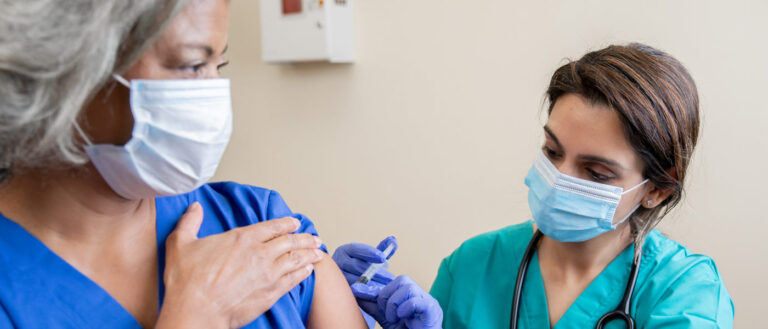When Ali Raja began the Doctor of Business Administration (DBA) program in person at Weatherhead School of Management in August 2018, his focus was on the opioid epidemic.
But at the onset of the COVID-19 pandemic last year, it quickly became apparent he needed to shift to treating patients with COVID-19 in the emergency department at Massachusetts General Hospital and trying to keep his family and clinical team safe. As part of those efforts, he co-founded GetUsPPE.org, a group raising awareness for the need of personal protective equipment for clinicians.
Raja has shared his expertise with media outlets like CNN and the Boston Globe. More recently, he and a Massachusetts General Hospital colleague published “Six Lessons on Fighting Burnout from Boston’s Biggest Hospital,” in the Harvard Business Review.
Recently, Weatherhead School of Management faculty member Phil Cola spoke with Raja about COVID-19 vaccinations, observing: “I can’t think of a better student expert to ask than Ali.”
Dr. Raja, how effective are the COVID-19 vaccines?
They are very, very effective where it counts the most—keeping us from getting severely ill or dying from COVID. Everyone is focusing on the efficacy rates of the various vaccines and how one may be slightly higher or lower than another.
However, it is important to remember that the recently approved vaccine was tested at a different phase of the pandemic when newer, more serious and transmissible forms of the virus were prevalent. So, it is not appropriate to compare the efficacy of the first vaccines from Pfizer and Moderna with the more recent vaccine from Johnson & Johnson.
If we focus on the data around prevention of severe illness and death, then they’re all amazingly effective.
How safe are the COVID-19 vaccines, including the risk of severe allergic reactions?
They are all very safe. Some of my friends just published a study in the Journal of the American Medical Association that showed that the rate of severe allergic reactions (or anaphylaxis) for the COVID-19 vaccines is about 2.5 per 10,000 patients, which makes them as safe as common antibiotics. Since immunization centers are prepared for these reactions, those few patients who had reactions recovered quickly with appropriate treatment.
How quickly am I protected after receiving the vaccine?
It varies somewhat from person to person. However, the new Centers for Disease Control guidelines state that you can consider yourself fully vaccinated two weeks after your last dose of the vaccine. This means you are fully vaccinated two weeks after the second dose of the Pfizer and Moderna vaccine, and you are fully vaccinated two weeks after the first and only dose of the Johnson and Johnson vaccine.
If the vaccines are so effective, why do we have to wear masks and physically distance after being fully vaccinated?
This is probably the most common question I get asked, both by my patients and the media. Remember that the vaccines don’t guarantee absolute protection against infection. This means that there’s a small chance—even after the vaccine—that you may develop a mild case of COVID-19 infection. Similarly, you may not have symptoms yourself, but still be at risk for transmitting the virus to others. Until we have better understanding, we’re still recommending that everyone wear masks and maintain physically distant in public settings.
Is it possible to get COVID-19 from the vaccine or spread it to others?
No, it’s completely impossible to get a COVID-19 infection from the vaccine. The vaccines do not contain live virus. Instead, they either use mRNA or—in the case of Johnson & Johnson’s vaccine—an inactivated viral vector, to trigger our immune response to COVID-19. Although you cannot get infected from the vaccine, there have been some reports of patients getting COVID-19 right after they were vaccinated and before they developed immunity. It’s important to remember that this is remains a possibility. It is not because of the vaccine itself, but because it takes two weeks after the final dose of the vaccine to be most effective. This possibility is one of the reasons why it is so important for people to continue to wear masks and physically distance from one another.

